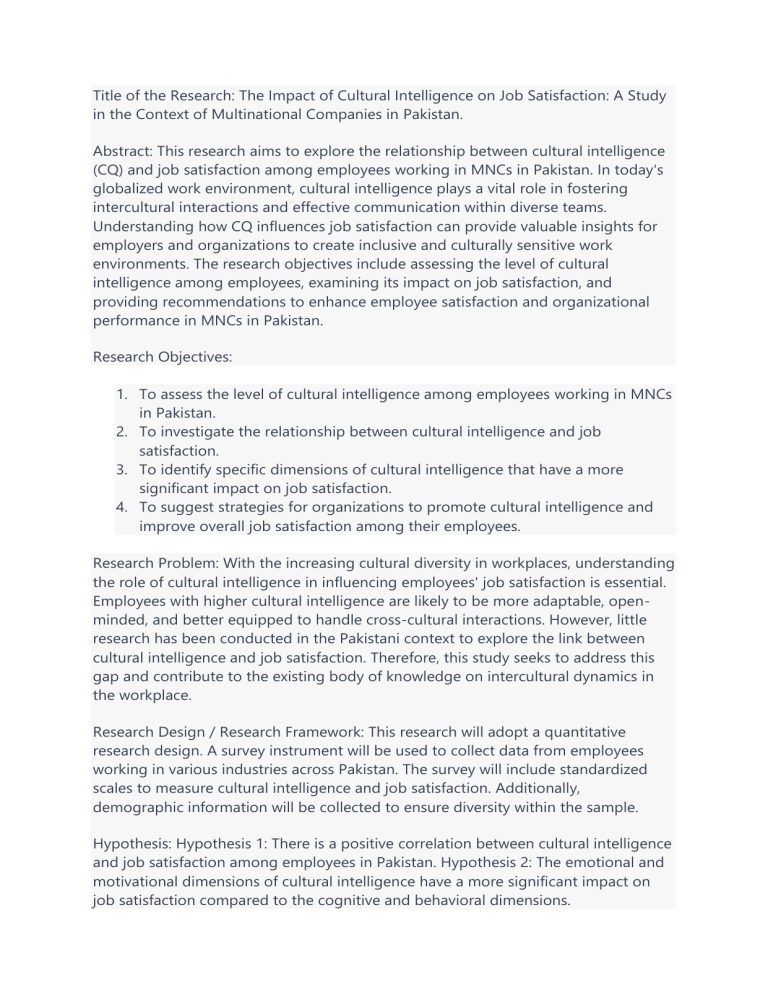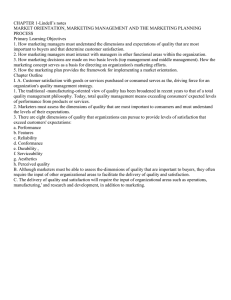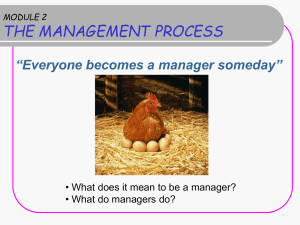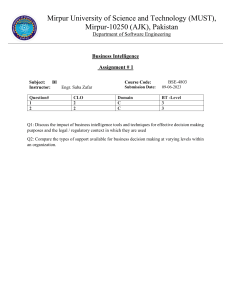
Title of the Research: The Impact of Cultural Intelligence on Job Satisfaction: A Study in the Context of Multinational Companies in Pakistan. Abstract: This research aims to explore the relationship between cultural intelligence (CQ) and job satisfaction among employees working in MNCs in Pakistan. In today's globalized work environment, cultural intelligence plays a vital role in fostering intercultural interactions and effective communication within diverse teams. Understanding how CQ influences job satisfaction can provide valuable insights for employers and organizations to create inclusive and culturally sensitive work environments. The research objectives include assessing the level of cultural intelligence among employees, examining its impact on job satisfaction, and providing recommendations to enhance employee satisfaction and organizational performance in MNCs in Pakistan. Research Objectives: 1. To assess the level of cultural intelligence among employees working in MNCs in Pakistan. 2. To investigate the relationship between cultural intelligence and job satisfaction. 3. To identify specific dimensions of cultural intelligence that have a more significant impact on job satisfaction. 4. To suggest strategies for organizations to promote cultural intelligence and improve overall job satisfaction among their employees. Research Problem: With the increasing cultural diversity in workplaces, understanding the role of cultural intelligence in influencing employees' job satisfaction is essential. Employees with higher cultural intelligence are likely to be more adaptable, openminded, and better equipped to handle cross-cultural interactions. However, little research has been conducted in the Pakistani context to explore the link between cultural intelligence and job satisfaction. Therefore, this study seeks to address this gap and contribute to the existing body of knowledge on intercultural dynamics in the workplace. Research Design / Research Framework: This research will adopt a quantitative research design. A survey instrument will be used to collect data from employees working in various industries across Pakistan. The survey will include standardized scales to measure cultural intelligence and job satisfaction. Additionally, demographic information will be collected to ensure diversity within the sample. Hypothesis: Hypothesis 1: There is a positive correlation between cultural intelligence and job satisfaction among employees in Pakistan. Hypothesis 2: The emotional and motivational dimensions of cultural intelligence have a more significant impact on job satisfaction compared to the cognitive and behavioral dimensions. Research Methodology: 1. Sampling: A random sampling method will be employed to select participants from different industries and organizational levels in Pakistan. 2. Data Collection: Primary data will be collected through a structured online survey that includes established scales to measure cultural intelligence and job satisfaction. 3. Data Analysis: The collected data will be analyzed using statistical techniques such as regression analysis to test the hypotheses and explore the relationship between cultural intelligence and job satisfaction. Develop 4 closed-ended questions: 1. On a scale of 1 to 7, rate your level of satisfaction with your current job. 2. How often do you engage in cross-cultural interactions at your workplace? a. Daily b. Weekly c. Monthly d. Rarely e. Never 3. Have you received any formal training or workshops on cultural intelligence in your current organization? (Yes/No) 4. On a scale of 1 to 7, to what extent does understanding and appreciating different cultures contribute to your job satisfaction? Develop 4 open-ended questions: 1. Can you share an experience where cultural intelligence positively influenced your interactions with colleagues from different cultural backgrounds? 2. What do you think are the key benefits of having a culturally intelligent workforce in a diverse organization? 3. In your view, what initiatives could organizations take to promote cultural intelligence among employees and improve job satisfaction? 4. Are there any specific challenges related to cultural differences that you have faced in your current job? If yes, please elaborate. Expected Findings: Based on the research, it is expected that cultural intelligence will have a positive impact on job satisfaction among employees working in MNCs in Pakistan. Additionally, the emotional and motivational dimensions of cultural intelligence are likely to be more influential in predicting job satisfaction compared to cognitive and behavioral dimensions. The findings from this study will offer valuable insights to MNCs, enabling them to develop strategies to enhance cultural intelligence among their employees and ultimately foster a more satisfying and harmonious work environment. Moreover, the research will shed light on the importance of cultural sensitivity in the workplace, particularly in diverse and multicultural settings such as MNCs operating in Pakistan.



